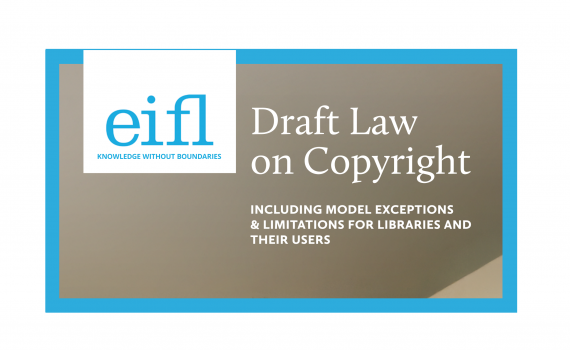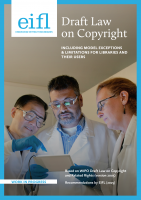
EIFL has published a new provision on Secondary Publication Rights (SPR) in copyright law. SPR gives authors (or their institutions) the legal right to make their research openly available after, or in parallel to, publication of a formal version of the work (usually the peer-reviewed Author’s Accepted Manuscript or the final, typeset version, known as the Version of Record) even in the absence of an open access publishing agreement, and even if the work is published behind a paywall.
The new SPR provision is contained in an updated and re-designed edition of EIFL’s Draft Law on Copyright (Including Model Exceptions & Limitations for Libraries and their Users) that provides guidance to librarians and policy-makers in EIFL partner countries when copyright laws are being updated.
The new provision aims to raise awareness of legislative developments in a growing number of countries - currently seven countries (Austria, Belgium, Bulgaria, France, Germany, Italy and the Netherlands)* have SPR in a range of laws such as science, technology & innovation, economics, culture, as well as copyright. The provision also provides policy-makers with sample language on what a good SPR provision in a copyright law might look like.
* Update! On 23 May 2025, Slovenia became the eight country to adopt SPR in an amendment to the Scientific Research and Innovation Activity Act - read more here.
Article 8 Secondary Publication Right
The new provision is numbered Article 8 in the re-designed edition of the EIFL Draft Law. Article 8, Secondary Publication Right, has five sub-sections. An explanatory note sets out the objective and rationale for the provision, as well as its practical effect.
Article 8.1 allows authors (or their institutions) to continue to have the right to make their works available in online repositories, notwithstanding any terms to the contrary that might be included in publisher contracts. It applies to all types of research (literary and non-literary), all types of outputs e.g. journal articles, book chapters, images and tables, and all versions, including the Version of Record which is essential for citation purposes. There is no embargo period, no minimum public funding requirement for the research, and no distinction between commercial and non-commercial research.
Article 8.2 ensures that a publisher cannot withdraw an offer to publish a research work just because the work has been deposited in an online repository. Article 8.3 creates a mechanism for citation information to be added by the repository e.g. at the request of the funder, publisher or repository manager, while Article 8.4 protects the right of secondary publication from override by any terms in contracts. The last section, Article 8.5, contains important definitions of “research work”, “version” of a research work, and “freely available”.
The EIFL SPR provision was drafted by an expert Working Group led by Jonathan Band J.D. with Faith Majekolagbe, Assistant Professor, Faculty of Law, University of Alberta, Iryna Kuchma, EIFL-OA Programme Manager, Milica Ševkušiš, EIFL-OA Programme, Project Coordinator, and Teresa Hackett, EIFL Copyright and Libraries Programme Manager. Additionally, Knowledge Rights 21, LIBER, Open Data and Intellectual Property Institute ODIPI and SPARC Europe commented on the draft text. EIFL is very grateful to the members of the Working Group for drafting the provision, and the commentators for their helpful input during the drafting process.
Global interest in SPR
The new SPR provision, and the re-designed edition of EIFL’s Draft Law on Copyright, were launched at an EIFL webinar on 27 May 2025. In the webinar, Iryna Kuchma, EIFL-OA Programme Manager, briefly explained Secondary Publication Rights and why they are important for researchers everywhere; Jonathan Band J.D. presented the main features of the new EIFL article, and Teresa Hackett, EIFL Copyright and Libraries Programme Manager, highlighted key issues discussed by the Working Group. Drafted as a stand-alone, self-contained provision, Article 8 can easily be implemented into national copyright laws (if copyright is the chosen route for implementation), and the language provides a good starting point for any country that is considering its introduction. There is clearly a global interest in SPR - registrations for the webinar were received from 21 countries around the world.
About the EIFL Draft Law on Copyright
The EIFL Draft Law on Copyright is a practical guide to assist librarians, policy-makers and legislators when copyright laws are being updated. It contains provisions that support access to knowledge and the public interest mission of libraries, and it reflects legislative developments, current thinking on copyright policy, and new technologies.
Read Article 8 Secondary Publication Right in the new edition of the EIFL Draft Law on Copyright (2025).
Watch the webinar recording launching the new provision and see the webinar slides.

SHARE / PRINT









